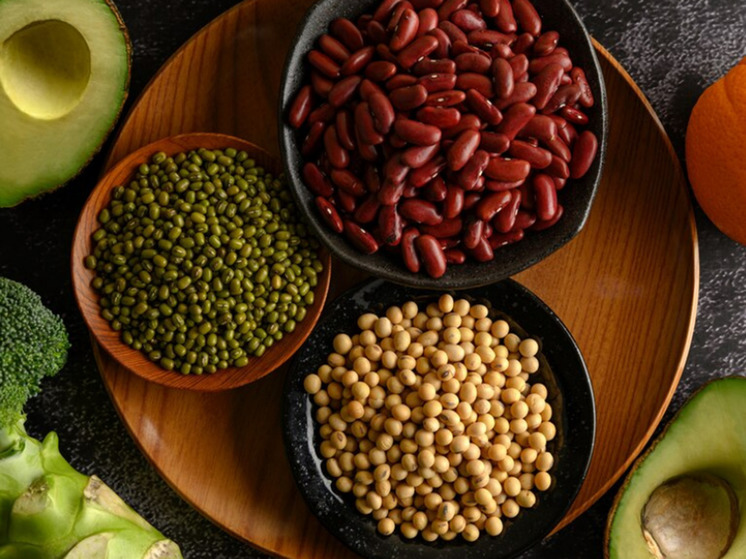Researchers show benefits of switching to nuts and legumes
Switching out processed meats for plant-based foods may reduce the risk of diabetes and heart disease, according to new research. A comprehensive review found that replacing animal foods such as red and processed meats or eggs with plant foods such as nuts or legumes may reduce the risk of heart disease and type 2 diabetes.

The review, published in the journal BMC Medicine, analyzed the results of 37 previous studies and its findings “highlight potential health benefits of including more plant-based foods in the diet,” Sabrina Schlesinger, head of the systematic reviews research group at the German Diabetes Center in Düsseldorf, told CNN.
Schlesinger and researchers from several German institutes collaborated on the paper, which they say is the first systematic review to look at the wide range of health effects associated with replacing animal products with plant-based ones.
Registered dietician Dwayne Mellor, a senior research fellow at Aston Medical School in Birmingham, UK, told CNN that the review “fits a pattern” “more extensive collection of information that informs our dietary recommendations.
“It adds to the picture we are already comfortable with,” Mellor added.
Previous studies have already shown some health benefits from a plant-based diet. A May study found that total cholesterol levels dropped by 7% in people following a plant-based diet compared to those who ate both meat and plants, while an August 2019 study found that eating more eating more plants and eating less meat is associated with increased life expectancy and a reduced risk of heart disease.
This latest review found a 27% reduction in overall incidence of heart disease when eating 50 grams of processed meat per day replaced with 28-50 grams of nuts per day, and a 23% decrease when meat was replaced with the same amount of legumes.
A 22% reduction in the incidence of type 2 diabetes was also associated with replacing 50 grams of processed meat per day with 10-28 grams of nuts per day, CNN noted.
Replacing butter with olive oil and eggs with nuts also indicated a reduced risk of developing type 2 diabetes and heart disease, although replacing other dairy products, fish, seafood or poultry was not clearly associated with a reduction in heart disease, the review found.
The findings in the new study «do not rely on the results of a single study, but systematically summarize all available data on the topic,» Schlesinger emphasizes, adding that this was the main strength of the review.
Although this approach did not lead to “brand new” conclusions, she noted the “consistency” results from previous studies, indicating “a high level of confidence in the effect estimate”.
The review only notes the association and does not show cause-and-effect or examine whether it exists at all, but it does suggest some possible reasons for these trends in the data.
Processed meat, as defined by the World Health Organization, Salting, curing, fermentation, smoking or other processes used to produce foods such as sausages, ham or canned meats contain saturated fatty acids, which potentially increase the risk of heart disease and type 2 diabetes.
Meanwhile, nuts, legumes and whole grains contain antioxidant and anti-inflammatory compounds that appear to reduce inflammation.
The study also puts forward an alternative explanation for the apparent health benefits — People who eat plant-based foods are already likely to lead healthier lifestyles overall, and although the studies were adjusted for participants' exercise, smoking, alcohol and eating habits, this effect cannot be ruled out.
“We can use this as a piece of information,” Mellor notes, “but we need to use it in intervention studies… to find out why they might show this effect.”
Simply switching from animal products Going plant-based does not automatically lead to a healthy diet. The result depends on which products are replaced.
«We need to be careful about words like 'plant-based' that may be used by food manufacturers,» Mellor warns. – After all, a packet of sugar is plant-based.
The USDA recommends that half of your diet be made from fruits and vegetables, a variety of vegetables and proteins, and half of your grains made from whole grains. The federal agency also recommends choosing foods and drinks that are lower in sugar, saturated fat and sodium, CNN notes.
In addition to considering the health benefits of different foods, it's important to consider culinary and cultural considerations when implementing such food choices, Mellor said. swaps.
“Just because statistics say swapping reduces risk, does it make culinary and cultural sense? And if it doesn't, it's unlikely to work as advice,» he said.
Anyone considering becoming a vegetarian or vegan should also be sure their diet is carefully planned to include adequate amounts iron, iodine, vitamin B12 and vitamin D, Mellor told CNN in May.


























































Свежие комментарии